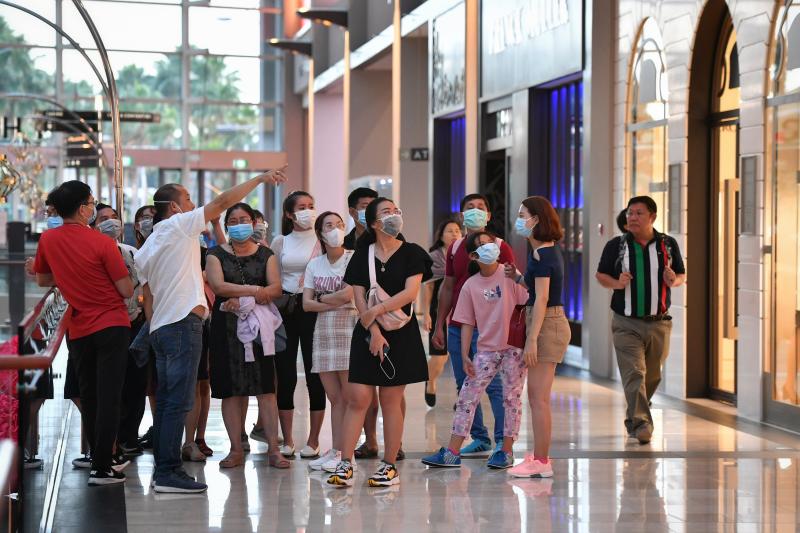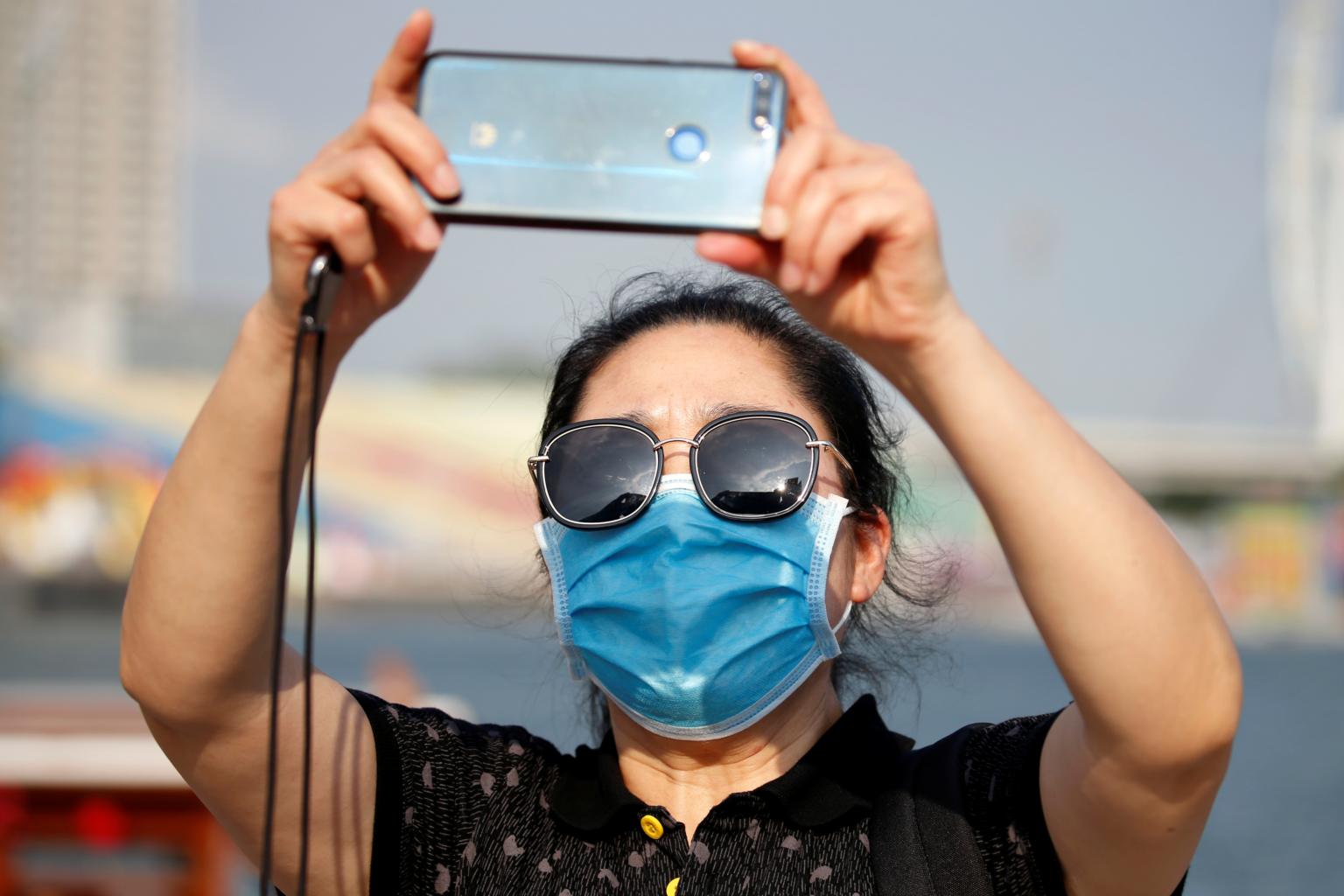Coronavirus: Singapore's tourism sector preparing for crisis
Sign up now: Get ST's newsletters delivered to your inbox

Visitors wearing masks as they walk around Marina Bay Sands on Jan 28, 2020.
ST PHOTO: CHONG JUN LIANG
SINGAPORE - Singapore's tourism sector is preparing for a potential crisis amid the spread of the deadly Wuhan virus and a ban on outbound group tours from China, its biggest source of visitors.
Businesses are gearing up to weather the storm a day after Trade and Industry Minister Chan Chun Sing said that the sector is of "immediate concern" when it comes to the economic impact of the global outbreak.
Travel agencies focused on inbound travel have already been hit hard, with one saying that its business, which caters exclusively to the Chinese market, has virtually vanished.
The local operator, which declined to be named, told The Straits Times that all upcoming inbound tours have been cancelled, after Chinese authorities ordered the suspension of tour sales last Friday (Jan 24) in an attempt to limit the spread of the virus.
"This is supposed to be one of the peak periods for us. We usually have at least 1,000 tourists coming around the Chinse New Year period, but that's 90 per cent gone," said a spokesman.
"We'll sit tight for now and maybe try to look for other markets, but it will be a few months at least before things go back to normal," he said, adding that the firm may put staff on no-pay leave in the meantime.
Mr Samson Tan, chairman of the inbound committee at the National Association of Travel Agents Singapore, said that the Chinese travel restrictions will have an "enormous" impact on the tourism industry, which includes hospitality, attractions, retail and food and beverage.
Mr Tan, who is also the chief executive of travel agency GTMC Travel, said that his firm has not been as hard hit as Chinese tourists make up only 10 per cent of customers.
But with Singapore among the countries that the virus has spread to, some travellers are opting to cancel their plans.
"So far I already have 12 cancellations from countries like the Philippines and Indonesia. If things get worse, we'll probably have to run on skeleton staffing," he said.
Industry members and experts said that if the situation is prolonged, its impact on businesses could be as catastrophic as when Singapore endured the severe acute respiratory syndrome (Sars) outbreak in 2003.
Some hotels facing cancellations have waived the usual fees or made provisions for guests to postpone reservations.
Royal Plaza on Scotts, for example, is waiving cancellation charges for guests from China who had booked stays during the Chinese New Year period.
"We have been receiving cancellations from China groups and independent travellers... (and) are expecting more cancellations in February," said general manager Patrick Fiat.
Staff at the hotel must have their temperatures taken twice a day, while those returning from China have been made to take 14 days of paid leave as a precaution, he added.
Accor, which owns hotel brands such as Raffles, Fairmont and Swissotel, said that guests who have made bookings through Feb 8 may postpone their stays or cancel and receive full refunds.

A tourist wearing a protective face mask takes photos at the Merlion Park in Singapore on Jan28, 2020.
PHOTO: REUTERS
Hotels and tourist attractions have also been stepping up sanitation measures and providing guests with hand sanitisers and face masks amid reports that some of the infected had visited popular locations.
Marina Bay Sands said that it would be progressively deploying temperature screening measures across the integrated resort in addition to disinfecting public areas and common touch points every hour. One of its hotel guests was diagnosed with the virus after checking out on Jan 24.
Wildlife Reserves Singapore said it is increasing the frequency of disinfection in high traffic areas and providing hand sanitisers at various locations across its parks.
Similar measures have been put in place in Sentosa's common areas and at the two hotels on the island where those diagnosed with the virus had stayed.
A spokesman for the Sentosa Development Corporation said that while it expects some businesses on the island to be affected, "it is premature to determine the full extent of the impact at this stage".
Singapore's retail sales, already slowed by a weaker economy and global uncertainty, will also be affected by the travel restrictions imposed in China, said the Singapore Retailers Association's executive director Rose Tong.
Businesses that are more reliant on the Chinese market are likely to be impacted by both the decrease in Chinese tourists as well as potential late deliveries of products manufactured in China, she said.
Mr Kelvyn Chee, managing director of Decks, which owns brands such as Island Shop and Surfers Paradise, said that he expects sales to drop by 20 to 30 per cent in the coming weeks due to weaker sentiment among local shoppers.
"We are very concerned that what happened during the Sars period will happen again and sales might drop by as much as 80 per cent," said Mr Chee, who added that his father's apparel company went bankrupt due to a sharp fall in sales during that period.
Mr Terrence Voon, director of communications and marketing capability at the Singapore Tourism Board (STB), said that tourism arrivals and spending will take a hit as Chinese visitors account for about 20 per cent of total international visitor arrivals to Singapore.
"STB has a diversified market portfolio that will help to mitigate this, but we are working with our partners to prepare for all eventualities... We expect the situation to persist for some time," he said.
Mr Voon said the STB is working with other agencies and industry partners to help tourism businesses. It has also enhanced measures to mitigate the risk of importation and transmission of the virus.
Tourism contributes about 4 per cent to Singapore's gross domestic product.
Experts said that while hotels and attractions will suffer, it is too early to gauge the extent of the damage.
Dr Michael Chiam, senior tourism lecturer at Ngee Ann Polytechnic, said that the Chinese travel restrictions may help the industry to recover faster.
"If it helps to contain the virus, the pain could be short term. But if doesn't show results, it could be just as bad as Sars, when the hotels and malls were all empty," he said.


